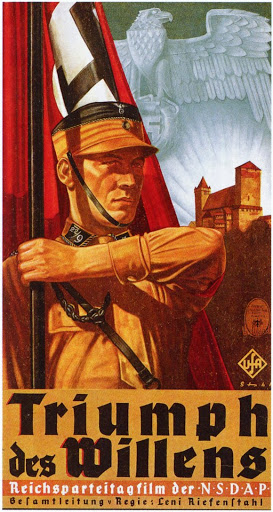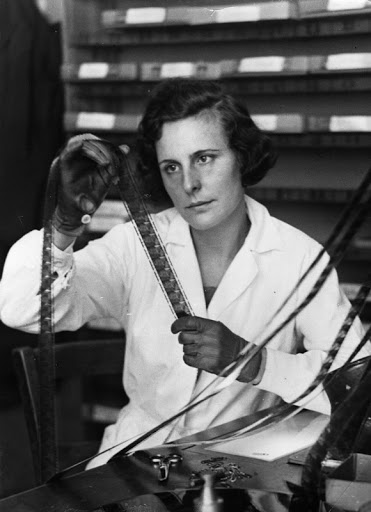She was a dancer, climber, actress, director, editor, photographer and diver. She was arguably the best woman director of all time, but she is mostly remembered for her collaboration with the nazis.
Helene Riefenstahl was born August 22, 1902 in Berlin. She began her artistic career as a dancer but a knee injury forced her to abandon this discipline.
She began acting in films shot in the mountains. Leni Riefenstahl made her film debut in "Der Heilige Berg (The Holy Mountain)" (1926) by writer/director Arnold Fanck.

From left to right: Marlene Dietrich, Anna May Wong and Leni Riefenstahl, at Pierre Ball. Berlin, 1928. Photo by Alfred Eisenstaedt.
She would appear in five more of Fanck films: she also appeared in his productions "Der grosse Sprung" (1927), "Die weisse Hölle vom Piz Palü" (1929), "Stürme über dem Montblanc" (1930), "Der weisse Rausch-Neue Wunder des Schneeschuhs" (1931) and "S.O.S. Eisberg" (1933).
In 1932, she directed her first film "Das Blaue Licht (The Blue Light)" [imdb] in which she plays the leading role; she was also cowriter and editor of the film. "Das Blaue Licht" received the Silver Lion at the Venice Film Festival.
This film that attracted the attention of Adolf Hitler on Riefenstahl. In 1933 she directed Der Sieg des Glaubens (Victory of Faith)" [Wikipedia] about the fifth rally of the nazi party. In 1935 she directed "Tag der Freiheit: Unsere Wehrmacht (Day of Freedom: Our Armed Forces)" [Wikipedia] about the Seventh Rally of the Nazi Party, focusing in the German Army. The next project would become her best known film: "Triumph des Willens (Triumph of the Will)" [Wikipedia] (1935) about the 1934 Nazi Party Rally.
 |  |
 |  |
Leni Riefenstahl operates a camera from a cable operated lift basket while filming 'Triumph des Willens' at the 1934 Nuremberg. Riefenstahl had installed one elevator in one of the giantic flag poles to film aerial views.

Riefenstahl stands next to a large stone eagle at a stadium in Nuremberg, during the filming of 'Triumph des Willens' in 1934.
Leni Riefenstahl and camera director Sepp Allgeier, during the shooting of 'Triumph des Willens'
Despite what it may seem nowadays, the film was well received and even received a gold medal at the 1935 Venice Biennale, and the Grand Prix at the 1937 World Exhibition in Paris.
She would later direct the two parts of the movie about the 1936 summer olympics which took place in Berlin: the "Olympia 1. Teil - Fest der Völker (Olympia Part 1. Festival of the Nations)" and "Olympia 2. Teil - Fest der Schönheit (Olympia Part 2. Festival of Beuaty)" [Wikipedia].
Pictures by Leni Rifenstahl from the 1936 Summer Olympics.
Several moments of Leni Riefenstahl shooting 'Olympia'
Meanwhile, since 1934 she had been working in the screepling of "Tiefland (Lowlands)" [Wikipedia], the adaptation of the opera by Eugene Aubert and libretto by Rudolph Lottar, based itself on the book in catalan language "Terra baixa", by Àngel Guimerà.
After the beginning of World War II, and disturbed by atrocities she witnessed, she got herself dispensed from shooting war documentaries. Using her influence as Adolf Hitler's favorite filmmaker she managed her own production company, Riefenstahl Film, GmbH , independently of the control of Joseph Goebbels who oversaw cultural and propaganda activities. Financed by Hitler himself, she began shooting in the Spain of Franco. She continued to shoot in natural landscapes of Germany and Italy, and even in studios of Berlin and Prague until 1944. After the war the film was confiscated, kept by French authorities for several years, but eventually returned to her. Four reels of film were missing when Riefenstahl received the film; notably the scenes shot in Spain, despite efforts she failed to retrieve the missing footage. After its final editing, the movie was released in 1954.
She would film only another film after Tiefland during her lifetime, "Impressionen unter Wasser".
But the worse part was that, after the war, Riefenstahl was imprisoned by the Allies for four years for allegedly being a Nazi sympathizer and was permanently blacklisted by the film industry. From 1945 through 1948 she was held in sundry American and French-run detention camps and prisons along with house arrest but although Riefenstahl was tried four times by various postwar authorities, she was never convicted through "denazification" trials either for her alleged role as a propagandist or for the use of concentration camp inmates in her films. However, she was found to be a "fellow traveler" who was sympathetic to the Nazis.
Leni Riefenstahl under arrest at home, and with husband Major Feder Jakub of the 3rd German Army. May 22, 1945
In 1956, inspired by Ernest Hemingway's 1935 novel "Green Hills of Africa", she began an ambitious film project in Africa drawn from another novel called Schwarze Fracht (Black Freight). Whilst scouting shooting locations, she almost died from injuries received in a truck accident. After waking up from a coma in a Nairobi hospital, she finished writing the script there, but was soon thoroughly thwarted by uncooperative locals, the Suez Canal crisis and bad weather (only test shots were ever made).

Leni Riefenstahl in Africa.
that they were further evidence of Riefenstahl's "fascist aesthetics". The Art Director's Club of Germany awarded Leni a gold medal for the best photographic achievement of 1975. She also sold the pictures to German magazines.
 |  |
 |  |
Photographs by Leni Riefenstahl.
She photographed the 1972 Summer Olympics in Munich for the Sunday Times Magazine.

Leni Riefenstah l at the 1972 Summer Olympics sent by the Sunday Times the day before her 70th birthday. August 22, 1972. Munich, Germany.
In 1974 Leni Riefenstahl took several pictures of Mick Jagger with his wife Bianca also for the Sunday Times.
Years later she befriended Andy Warhol and was a Guest of Honour at the 1976 Olympic Games in Montreal.
Riefenstahl later said that her biggest regret was meeting Hitler: "It was the biggest catastrophe of my life. Until the day I die people will keep saying, 'Leni is a Nazi', and I'll keep saying, 'But what did she do?'" She won more than 50 libel cases against people accusing her of knowledge having to do with Nazi crimes.
At age 72, Riefenstahl began pursuing underwater photography, after lying about her age to gain certification for scuba diving (she claimed she was 52). In 1978, she published a book of her below-water photographs, Korallengärten (Coral Gardens) followed by the 1990 book; Wunder unter Wasser (Wonder under Water). On August 22, 2002, her 100th birthday, Riefenstahl released a film called Impressionen unter Wasser ( Underwater Impressions ), an idealized documentary of life in the oceans. She was the oldest scuba diver in the world at this time.
She survived a helicopter crash in Sudan in 2000 while trying to learn the fates of her Nuba friends during the Sudanese civil war.
In 1993 Ray Müller directed a wonderful documentary about her life and work "Die Macht der Bilder: Leni Riefenstahl (The Wonderful Horrible Life of Leni Riefenstahl)", one of the best biographical documentaries of all time.
In 2002 she released "Impressionen unter Wasser" [Wikipedia], consistent in 45 minutes of Riefenstahl's underwater cinematography.
In 2003, Leni Riefenstahl dies at Pöcking at the age of 101.






























.jpg)












Truly an amazing lady
ReplyDeleteThis comment has been removed by a blog administrator.
ReplyDelete